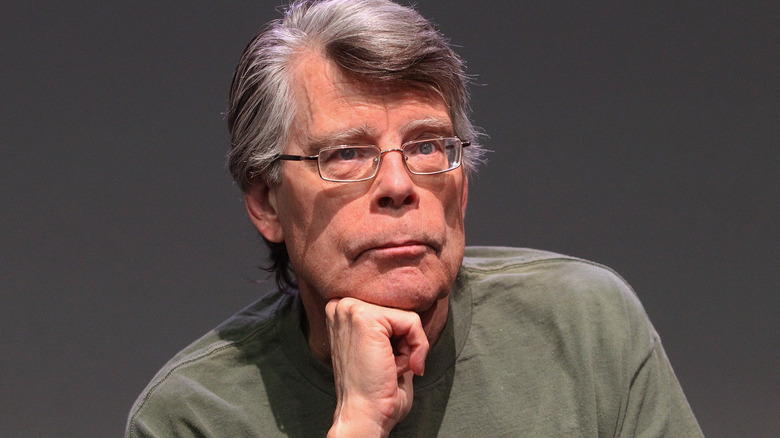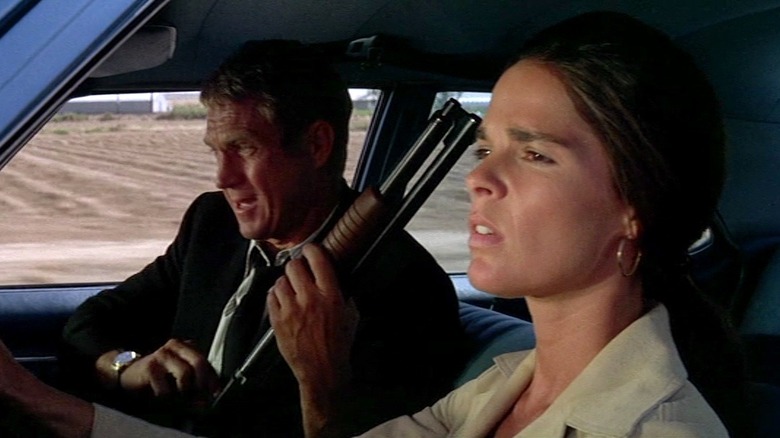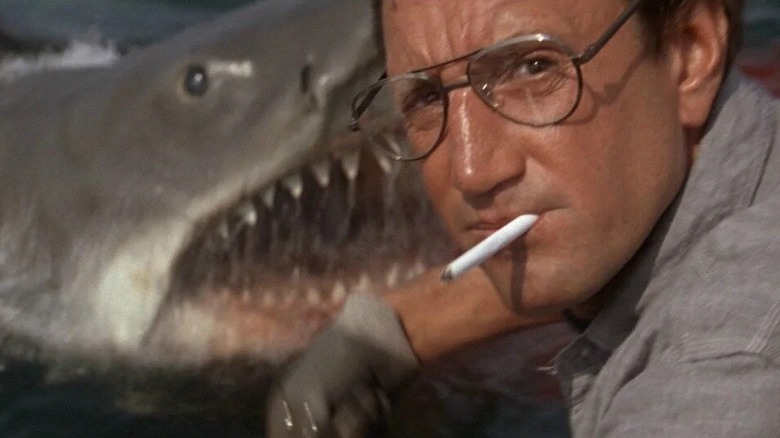Stephen King's Favorite Movies Include 6 Classics From The '70s
Bestselling author Stephen King has shaped pop culture for decades, writing novels like "The Shining" and "It" that have since been adapted into now-classic films and hit TV shows. Pop culture has inevitably influenced the prolific author's work, as well; for example, he described the premise of the sprawling vampire novel "'Salem's Lot" as "'Peyton Place' meets 'Dracula'" and the plot of "Rita Hayworth and Shawshank Redemption" famously hinges on a poster of the actress.
Fortunately for fans eager to know more about King's favorite films, the master of horror has shared his top-ten list – excluding adaptations of his own works — on X. "In no particular order," according to King, these films are "Sorcerer," "The Godfather Part II," "The Getaway," "Groundhog Day," "Casablanca," "The Treasure of the Sierra Madre," "Jaws," "Mean Streets," "Close Encounters of the Third Kind," and "Double Indemnity." While every film on King's list is worth watching, it is notable that the majority of his picks — six in all — come from a single decade: the 1970s.
The '70s were a critical decade for King, as his first novel, the telekinetic terror "Carrie," was published in 1974. Before the decade was out, he would unleash unforgettable books like "The Stand" and "The Long Walk" (under the pseudonym Richard Bachman) on an unsuspecting world. What makes these six films from the '70s so remarkable, and what do they reveal about Stephen King? Let's dive in.
Stephen King loves dramatic thrillers
Stephen King's favorite films are an eclectic mix of genres, including science fiction, comedy, and noir, but looking at the listed films from the 1970s, one thing is apparent: he loves a good thriller.
Thriller films thrived in the 70s — the dissolution of the Hays Code and the Hollywood studio system led to the unabashed freedom of the New Hollywood movement. Now the good guys could lose and there was no guarantee of a happy ending. Such is the case with "Sorcerer," William Friedkin's 1977 nail-biter about truck drivers in Central America transporting unstable dynamite through dangerous terrain, where the slightest bump could blow them to smithereens. The film "generate[s] suspense through beautiful simplicity," King once wrote in Entertainment Weekly.
The 1970s were eager to explore the criminal mind in all its cynical complexity and brutality. Sam Peckinpah's "The Getaway" is a stylish and violent thriller from 1972 about a bank robber and his wife (Steve McQueen and Ali MacGraw) on the run from the law. "Mean Streets" is Martin Scorsese's harrowing 1973 mafia neo-noir, his first collaboration with frequent leading man Robert De Niro and one of Looper's 59 best crime films of all time. And 1974's "The Godfather Part II" follows two generations of the Corleone crime family and their rise to power. It's one of the best films of the 1970s and is arguably Francis Ford Coppola's masterpiece.
Steven Spielberg directed two of King's favorites
Steven Spielberg has the distinction of being the only filmmaker with two films featured in Stephen King's top ten. The winner of three Academy Awards and the highest-grossing director in film history, Spielberg is — like King — one of the defining names of the 20th century, giving his double-appearance extra significance.
Spielberg's "Jaws" follows a killer great white shark preying on the locals of Amity Island, and the three men (Roy Scheider, Richard Dreyfuss, and Robert Shaw) who join forces to destroy it. An enormous success that inspired three sequels, "Jaws" helped invent the modern day blockbuster and, interestingly, is the only film on King's list that could be considered a horror. "Close Encounters of the Third Kind" is a more mysterious and awe-inspiring science fiction drama about two ordinary families that encounter UFOs, and it has joined the pantheon of the world's greatest science fiction films.
Released in 1975 and 1977, respectively, "Jaws" and "Close Encounters" are tonally and spiritually very different films about mankind's relationships with nature and the cosmos. But they both center on an American everyman (Brody in "Jaws" and Roy in "Close Encounters") who brushes against something terrifying and unknown; sailing in shark-infested waters and greeting aliens from another planet. And whether it's Ben Mears returning to his hometown of Salem's Lot or Jack Torrance and his family arriving at the Overlook Hotel, that is a premise that Stephen King fans know all too well. It's no wonder that "Jaws" and "Close Encounters" are two of his favorite films.


